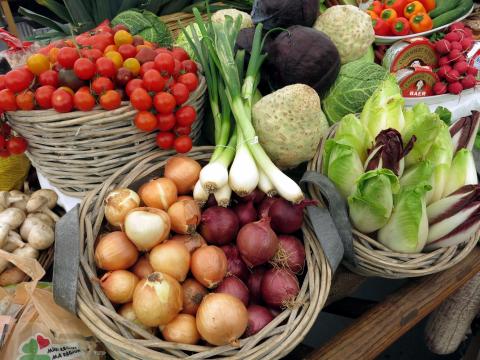Guide for CSA Farmers amid COVID 19

Community supported agriculture (CSA) has long been a successful way for New Hampshire growers to supply their local community with fresh and healthy product. This will continue to be true amid the current COVID-19 outbreak, as consumers will continue to seek out local product. It is also critical to stress that there is no documented evidence that COVID-19 can be spread through food. Nevertheless, there are certain steps that CSA producers should take to ensure the health of their staff, the public and themselves.
Review your farm safety plan, and update it accordingly. Train staff on new guidelines.
Consider having all employees read this document during training: Farm Food Safety Worker Health and Hygiene
Train all staff on COVID-19, and communicate to them the importance of staying at home if sick.
Employee management
Mandate regular hand washing. If handwashing is not available hand sanitizer (with minimum 60% alcohol) should be used as a second option.
- Before starting and returning to work
- After using the toilet
- After working with pesticides
- After handling trash
- Before and after eating or smoking
- After touching or working with animals or animal waste
- Before putting gloves on
- Anytime hands can become contaminated, such as when you touch your face, hair, etc. Before entering cooler or wash/pack area
If possible, put wall mounted hand sanitizer at critical points throughout the operation
Provide tissues, paper towels and a hands-free, closed lid trash receptacle
Consider disposable gloves whenever handling produce. Follow these Penn State guidelines about using gloves.
Consider how personal accessories (bracelets, ear buds, radios, etc.) may interfere with sanitation.
Farm equipment like hoes, harvest knives, harvest buckets and other commonly touched tools should be cleaned and sanitized as necessary. Keep in mind, a sanitizer may be ineffective if the implement is not cleaned of soil and debris first. Sanitizer must be appropriately labeled for use.
Cleaning and Sanitizing
COVID-19 is primarily spread human-to-human, and little evidence suggests it is spread through food or contact surfaces. However, commonly used items or areas of high touch points should be disinfected regularly. There are other common viruses and bacteria that can cause illness if food contact surfaces are not effectively cleaned and sanitized. Note that for CSA farmers the greatest risk will come when customers come to the farm. Thus cleaning and sanitizing frequently touched surfaces is a good idea.
If regular cleaning and sanitizing contact surfaces are new to you, here’s some more info for your farm
There are many disinfecting solutions, here’s one:
Prepare a bleach solution by mixing: note this is a higher rate than typical everyday sanitation. This is appropriate for high use areas, not food contact surfaces.
- 5 tablespoons (1/3rd cup) bleach per gallon of water or
- 4 teaspoons bleach per quart of water
Sanitize doorknobs and refrigerator handles regularly.
Delivery and pickup
Consider reducing the number of people on the farm at one time by assigning staggered pickup times.
As people enter your barn or farm store for pickup, consider how YOU will remain safe. Limit your interaction with customers by adding additional signage, and communicate directions via email prior to pickup.
Keep doors and windows open to ventilate air when pickup occurs.
No sampling or food demonstrations.
Consider boxed shares in lieu of open or free choice CSA. Communicate to your customers that this change is being made for their safety. If time does not allow you to pre-box shares, make steps to make pickup as quick as possible, limit the amount of touch points. Do as much as you can to pre-aggregate product.
Consider asking members to remain in their vehicle and have an employee bring product to them.
Consider a pop-up stand, off the farm. Promote this using social media and email communication.
With the renewed interest in local agriculture, you may have new customers. Be sure to share recipes and cooking ideas to support these new customers.
This is a great time to promote yourself on social media. The public is looking for locally sourced product in order to avoid a crowded shopping center. New to social media? Use this guide to learn how.
Add a cashless payment option.
Many online services and payment apps exist to help you connect directly to consumers. The following list has not been vetted and should not be considered an endorsement of a particular product:
- PayPal
- Venmo
- CashApp
- Barn2Door
- GrazeCart
- FarmDrop
- Curbside Pickup through Square
- Forager
- Cropolis
- Farmigo
- Food4aAll
- Harvie
- Local Food Marketplace
- Local Line
- Shopify
MOFGA review of online platforms
Additional guidance:
World Health Organization https://www.who.int/docs/default-source/coronaviruse/getting-workplace-ready-for-covid-19.pdf?sfvrsn=359a81e7_6
Farm Food Safety— Cleaning and Sanitizing Food Contact Surfaces
Farm Food Safety — Food Contact Surfaces and Materials
Related Resource(s)
